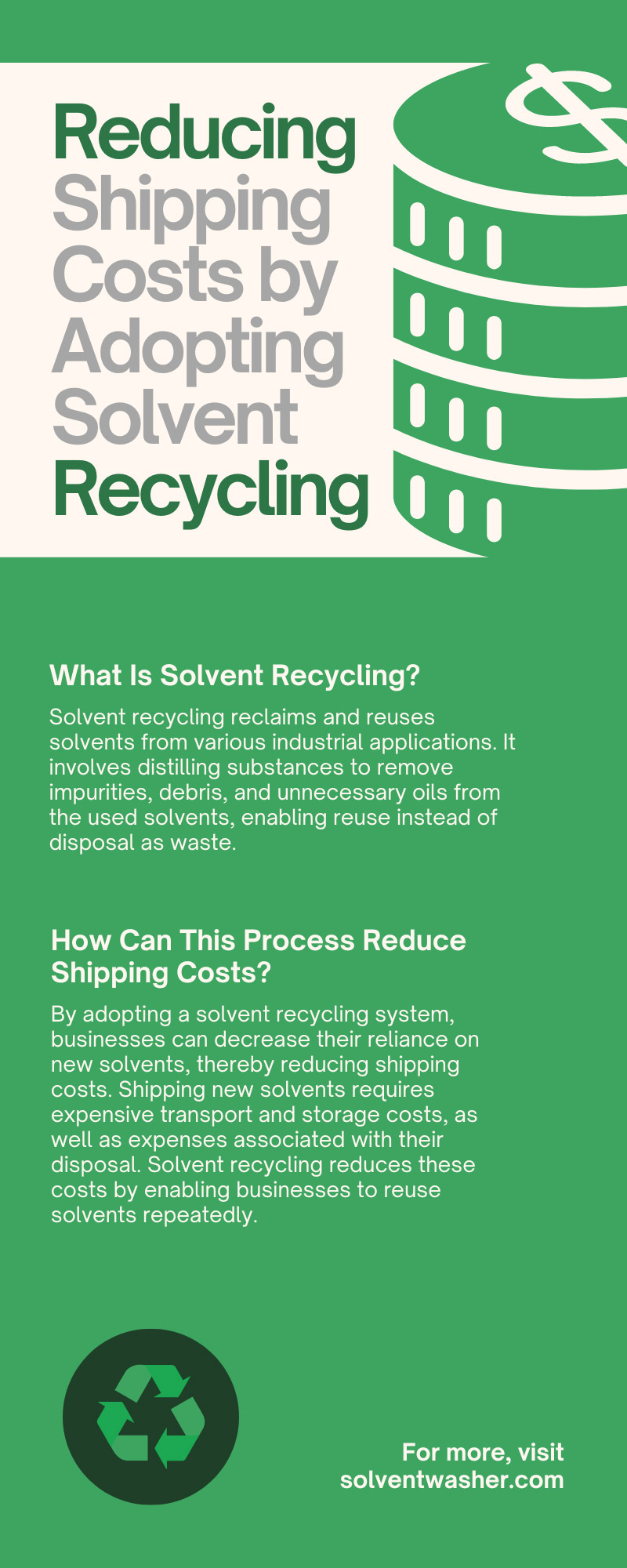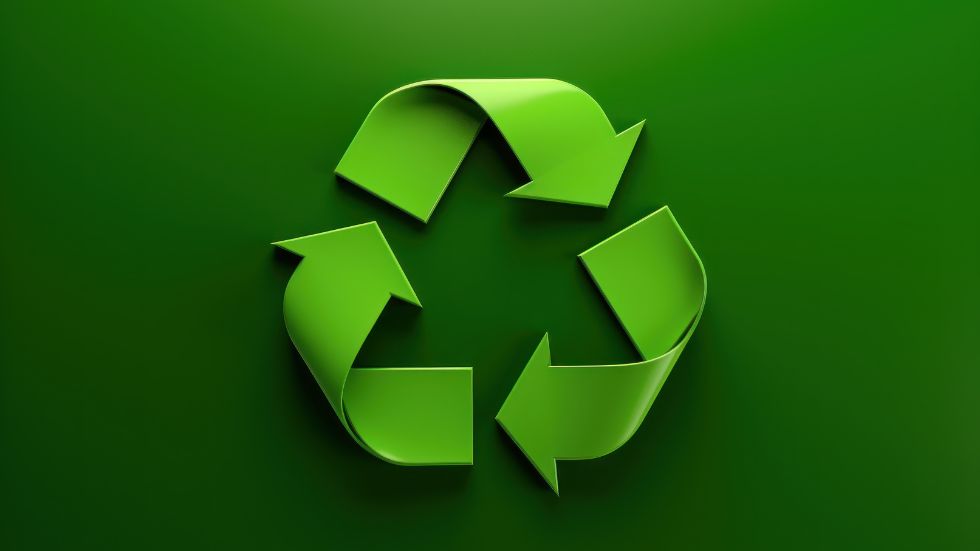As businesses strive to reduce their carbon footprint and minimize expenses, solvent recycling offers a practical and economical solution. Solvent recycling equipment can help businesses recycle and reuse solvents, leading to significant savings on both shipping costs and material expenses. Learn how your company can reduce shipping costs by adopting solvent recycling, along with other valuable information.
What Is Solvent Recycling?
Solvent recycling reclaims and reuses solvents from various industrial applications. It involves distilling substances to remove impurities, debris, and unnecessary oils from the used solvents, enabling reuse instead of disposal as waste.
Solvent recycling provides multiple benefits, including cost savings, resource conservation, pollution reduction, and ensured compliance with regulations for solvent waste management.
By recycling solvents, organizations can minimize waste generation and contribute to a more sustainable and environmentally friendly approach to industrial operations.
How Can This Process Reduce Shipping Costs?
By adopting a solvent recycling system, businesses can decrease their reliance on new solvents, thereby reducing shipping costs. Shipping new solvents requires expensive transport and storage costs, as well as expenses associated with their disposal. Solvent recycling reduces these costs by enabling businesses to reuse solvents repeatedly.
Types of Businesses That Should Use Solvent Recycling
Various industries can benefit from solvent recycling, including manufacturing operations, transportation industries, painting businesses, and refinishing facilities. Furthermore, printing companies, furniture makers, repair facilities, and environmental service companies can use this system.
Of course, each industry has different solvent needs and uses. For example, ketones are popular solvents that are relevant in industrial cleaning and the production of plastics and adhesives. Alternatively, Trichloroethylene (TCE) is a degreasing solvent used in manufacturing.
Other Types of Solvents
As previously mentioned, a solvent recycling machine can recovery and purify various types of solvents. Besides ketones and TCE, solvent options include:
- Xylene
- Alcohols (ethanol, methanol, isopropyl alcohol)
- Ethers (diethyl ether, ethyl tert-butyl ether)
- Esters (ethyl acetate, butyl acetate)
- Glycol ethers (ethylene glycol and monomethyl ether)
- Chlorinated solvents (perchloroethylene)
- Aromatic solvents (toluene, benzene)
- Hydrocarbon solvents (naphtha, mineral spirits)
Benefits of Implementing Solvent Recycling
There are numerous benefits to implementing solvent recycling in your business. For starters, it’s a sustainable business practice that reduces greenhouse gas emissions and waste. After all, why dispose of solvents that can regain a new life through recycling?
Furthermore, your business can lower material expenses since solvent recycling lets you reuse expensive solvents, leading to notable savings. Not to mention, reusing solvents can support resource conservation, as recycling reduces the consumption of natural resources that manufacturers need to produce new solvents.
Additionally, some bio-based solvents incorporate natural acids from plant sources. This means that through recycling, companies can contribute to the conservation of raw materials.
Considerations Before Adopting Solvent Recycling
Before implementing a solvent recycling program in your business, consider the following:
Cost
Analyze the expenses associated with purchasing, maintaining, and operating a solvent recycling system. While it may seem like an additional investment, a recycling program can save you money in the long run by reducing the need for new solvent purchases. However, you can still compare the costs of solvent recycling to the costs of buying new solvents or disposing of old ones to aid in your decision.
You’ll also want to consider the size of your operation and the amount of waste you generate, as this can affect the overall cost of a recycling system. By carefully analyzing the costs of solvent recycling, you can determine if it’s right for your business.
Capacity
Capacity is another essential factor to consider. After all, recycling systems do not have a one-size-fits-all solution. Carefully assess the volume of solvents your business operations utilize to determine the appropriate system size for your needs. This ensures maximum efficiency and effectiveness in your recycling process without risking overburdening or underutilizing your solvent recycling machine.
At Solvent Waste Management, we offer a range of machines with different capacities. Our Solvent Washer Model SW 8 can handle 8-gallon loads, while the Model SW 70 can handle 70-gallon loads. In addition, we have other models that can fit mid-sized to large operations.
Solvent Compatibility
It’s important to understand that different solvents may have varying levels of compatibility with recycling equipment. Consider the types of solvents you use in your processes and evaluate whether recycling machines can effectively recover them.
Compliance With Regulations
Check whether the solvent recycling machine complies with relevant regulations governing waste management and recycling practices in your state. You can also consult the United States Environmental Protection Agency (EPA) for best practices regarding your industry’s waste management operations. Overall, adhering to state regulations can help you maintain regulatory compliance.
How To Manage Waste From Solvent Recycling
Proper waste management is vital in solvent recycling, as the process can generate waste that requires special handling procedures. Here are some of the best practices and tips for managing solvent recycling waste:
Identify the Types of Waste
Proper waste management starts with identifying the types of waste generated by solvent recycling. Depending on the specific substances and processes, you may generate residual solvent, solids, or sludge. Each type of waste requires different handling procedures and disposal methods. For instance, some materials need treatment prior to disposal.
Designate Storage Areas
After identifying the types of waste, designate specific storage areas for each of them; this is especially important for potentially hazardous or flammable waste. Properly label and secure your storage areas to prevent accidents and unauthorized access. Ensure your employees receive training on the appropriate storage and handling procedures for each waste type, and emphasize the significance of proper labeling and documentation.
Implement a Tracking System
To prevent waste accumulation, implement a tracking system for managing your solvent recycling waste. This system should document each waste stream, its disposal method, and any treatment or transport records. This way, you have an auditable record of your waste management practices.
Work With a Waste Management Partner
Dealing with the waste after solvent recycling is challenging, especially when you have large volumes or multiple waste streams. Partnering with a reputable waste management company can alleviate this burden. They will assist in identifying optimal disposal methods for each waste type, as well as managing waste transportation and treatment. This approach saves you time, money, and hassle while promoting effective practices.
Solvent recycling offers a practical and cost-effective solution for businesses wanting to implement eco-friendly operations while minimizing the shipping costs of new solvents. Start your solvent recycling journey by contacting Solvent Waste Management. We look forward to serving you.


